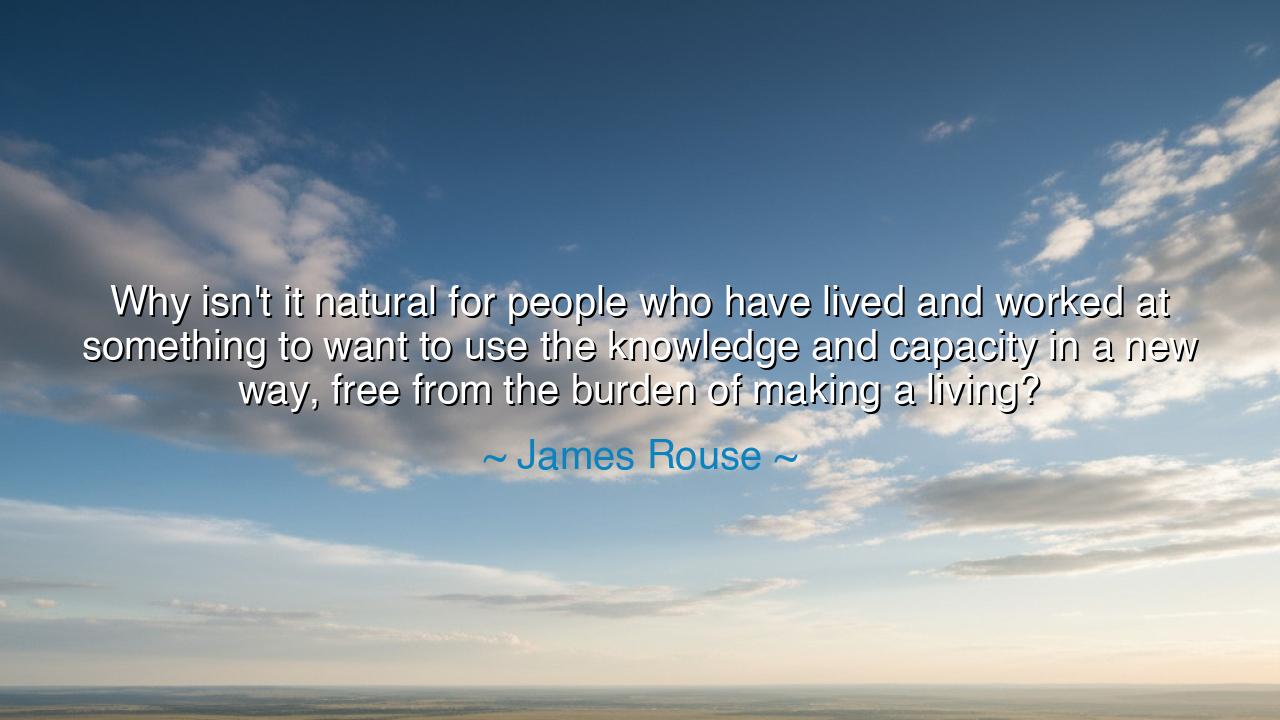
Why isn't it natural for people who have lived and worked at
Why isn't it natural for people who have lived and worked at something to want to use the knowledge and capacity in a new way, free from the burden of making a living?






The words of James Rouse rise like a hymn to the dignity of labor and the yearning of the human spirit: “Why isn’t it natural for people who have lived and worked at something to want to use the knowledge and capacity in a new way, free from the burden of making a living?” In this question burns not frustration, but revelation. It is the cry of a man who saw that work, though born of necessity, ought to mature into creation. Rouse speaks not merely of employment, but of the divine calling of the human soul—to labor first for survival, and later for meaning. His words ask why, after years of toil and mastery, a person should not wish to wield their knowledge and capacity in freedom, to shape beauty or service without the chains of necessity.
In the ancient days, our forebears believed that every stage of life held its own sacred duty. Youth was for learning, manhood for labor, and age for wisdom. But Rouse, seeing the restless heart of modern man, dares to restore that old wisdom to our world: that the end of labor should not be rest, but rebirth. For when a person has worked long at the forge of experience, they are not exhausted clay—they are tempered steel, ready to shape the world anew. Freedom from the burden of making a living is not idleness; it is the dawn of true creativity. It is the time when one’s hands, once bound to duty, are loosed for love.
Consider the life of Leonardo da Vinci, who in his early years painted for patrons and built machines for princes, yet whose later works—those quiet notebooks of the mind—were born not for payment but for the sheer joy of discovering truth. He painted the “Mona Lisa” not as a commission, but as an act of meditation. When freed from the burden of gain, his genius flowered into timeless wonder. Leonardo lived Rouse’s dream centuries before it was spoken: that work, when unshackled from necessity, becomes a hymn of the soul.
So too in our own age do we see this truth unfold. The teacher, long bound to classrooms, retires and begins to write poetry. The engineer, once caught in deadlines and blueprints, turns to crafting instruments of art or charity. The mother, after years of selfless care, awakens to her own voice and begins to paint, to teach, to lead. These are not mere pastimes—they are second creations, born of the same fire that once built cities and carried nations forward. For when survival no longer dictates the rhythm of one’s days, the heart rediscovers its divine purpose: to create, to give, to illuminate.
Rouse’s words come, too, as a rebuke to a culture that mistakes work for worth. He asks why it is strange for a person, freed from earning, to seek expression rather than escape. Should not the wisdom of the seasoned be the most valuable gift to society? Should not those who have “lived and worked” be our true visionaries, unbound from hunger or fear? The ancients revered their elders not because they were done working, but because they had at last learned what work truly means—to serve creation itself.
There is, within Rouse’s question, a quiet defiance against the tyranny of mere productivity. He calls us to see that the culmination of a life’s labor is not retirement, but renewal—not the fading of usefulness, but the flowering of purpose. For what is knowledge if not a seed meant to grow again, in new soil, beneath gentler suns? To have lived and worked is to have gathered power; to use that power freely is to honor the gift of existence.
Therefore, O listener, learn the lesson that lies within these words: labor not only to live, but live to labor for love. Use your knowledge as a torch to light the way for others. When the burden of earning fades, do not sink into silence—rise into creation. Mentor the young. Build with your wisdom. Dream with the freedom your years have purchased. For the measure of life is not how long we labor for bread, but how deeply we labor for meaning.
In the end, Rouse’s question becomes a commandment to the soul: let your experience serve something greater than yourself. When your days of necessity are done, let your spirit build what your hands could not before—beauty, compassion, and hope. Thus shall your knowledge become your legacy, and your freedom the fountain from which future generations drink.






AAdministratorAdministrator
Welcome, honored guests. Please leave a comment, we will respond soon